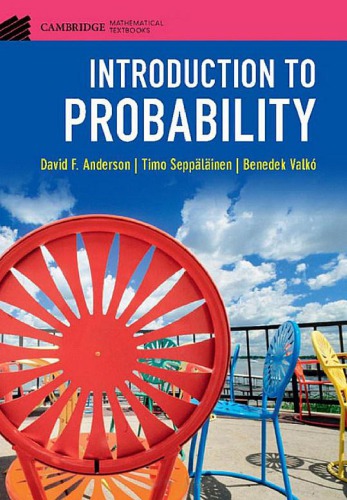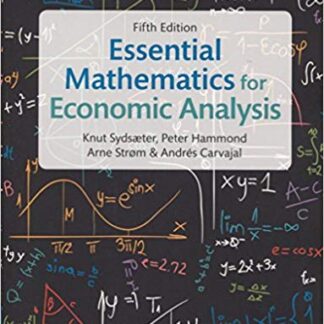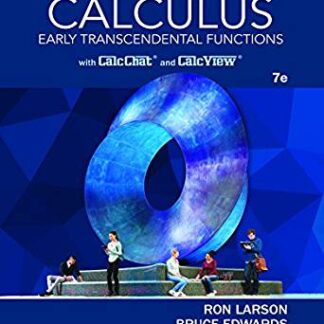Description
Introduction to Probability 1st Edition by David F. Anderson, ISBN-13: 978-1108415859
[PDF eBook eTextbook]
- Publisher: Cambridge University Press; 1st edition (November 2, 2017)
- Language: English
- 442 pages
- ISBN-10: 9781108415859
- ISBN-13: 978-1108415859
This classroom-tested textbook is an introduction to probability theory, with the right balance between mathematical precision, probabilistic intuition, and concrete applications. Introduction to Probability covers the material precisely, while avoiding excessive technical details. After introducing the basic vocabulary of randomness, including events, probabilities, and random variables, the text offers the reader a first glimpse of the major theorems of the subject: the law of large numbers and the central limit theorem. The important probability distributions are introduced organically as they arise from applications. The discrete and continuous sides of probability are treated together to emphasize their similarities. Intended for students with a calculus background, the text teaches not only the nuts and bolts of probability theory and how to solve specific problems, but also why the methods of solution work.
Table of Contents:
Half-title page
Series page
Title page
Copyright page
Dedication
Contents
Preface
To the instructor
From gambling to an essential ingredient of modern science and society
Chapter 1 Experiments with random outcomes
1.1 Sample spaces and probabilities
1.2 Random sampling
1.3 Infinitely many outcomes
1.4 Consequences of the rules of probability
1.5 Random variables: a first look
1.6 Finer points ♣
Exercises
Chapter 2 Conditional probability and independence
2.1 Conditional probability
2.2 Bayes’ formula
2.3 Independence
2.4 Independent trials
2.5 Further topics on sampling and independence
2.6 Finer points ♣
Exercises
Chapter 3 Random variables
3.1 Probability distributions of random variables
3.2 Cumulative distribution function
3.3 Expectation
3.4 Variance
3.5 Gaussian distribution
3.6 Finer points ♣
Exercises
Chapter 4 Approximations of the binomial distribution
4.1 Normal approximation
4.2 Law of large numbers
4.3 Applications of the normal approximation
4.4 Poisson approximation
4.5 Exponential distribution
4.6 Poisson process ♦
4.7 Finer points ♣
Exercises
Chapter 5 Transforms and transformations
5.1 Moment generating function
5.2 Distribution of a function of a random variable
5.3 Finer points ♣
Exercises
Chapter 6 Joint distribution of random variables
6.1 Joint distribution of discrete random variables
6.2 Jointly continuous random variables
6.3 Joint distributions and independence
6.4 Further multivariate topics ♦
6.5 Finer points ♣
Exercises
Chapter 7 Sums and symmetry
7.1 Sums of independent random variables
7.2 Exchangeable random variables
7.3 Poisson process revisited ♦
Exercises
Chapter 8 Expectation and variance in the multivariate setting
8.1 Linearity of expectation
8.2 Expectation and independence
8.3 Sums and moment generating functions
8.4 Covariance and correlation
8.5 The bivariate normal distribution ♦
8.6 Finer points ♣
Exercises
Chapter 9 Tail bounds and limit theorems
9.1 Estimating tail probabilities
9.2 Law of large numbers
9.3 Central limit theorem
9.4 Monte Carlo method ♦
9.5 Finer points ♣
Exercises
Chapter 10 Conditional distribution
10.1 Conditional distribution of a discrete random variable
10.2 Conditional distribution for jointly continuous random variables
10.3 Conditional expectation
10.4 Further conditioning topics ♦
10.5 Finer points ♣
Exercises
Appendix A Things to know from calculus
Appendix B Set notation and operations
Appendix C Counting
Appendix D Sums, products and series
Appendix E Table of values for Φ(x)
Appendix F Table of common probability distributions
Answers to selected exercises
Bibliography
Index
David F. Anderson is a Professor of Mathematics at the University of Wisconsin, Madison. His research focuses on probability theory and stochastic processes, with applications in the biosciences. He is the author of over thirty research articles and a graduate textbook on the stochastic models utilized in cellular biology. He was awarded the inaugural Institute for Mathematics and its Applications (IMA) Prize in Mathematics in 2014, and was named a Vilas Associate by the University of Wisconsin, Madison in 2016.
Timo Seppäläinen is the John and Abigail Van Vleck Chair of Mathematics at the University of Wisconsin-Madison. He is the author of over seventy research papers in probability theory and a graduate textbook on large deviation theory. He is an elected Fellow of the Institute of Mathematical Statistics. He was an IMS Medallion Lecturer in 2014, an invited speaker at the 2014 International Congress of Mathematicians, and a 2015–16 Simons Fellow.
Benedek Valkó is a Professor of Mathematics at the University of Wisconsin, Madison. His research focuses on probability theory, in particular in the study of random matrices and interacting stochastic systems. He has published over thirty research papers. He has won a National Science Foundation (NSF) CAREER award and he was a 2017–18 Simons Fellow.
What makes us different?
• Instant Download
• Always Competitive Pricing
• 100% Privacy
• FREE Sample Available
• 24-7 LIVE Customer Support





